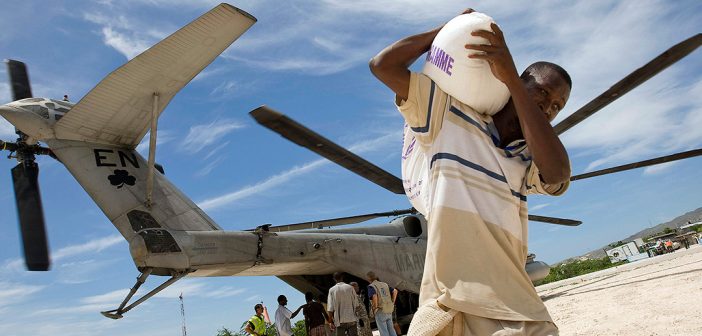It takes a certain kind of person to take the Ignatian exhortation to “Go forth and set the world on fire” seriously.
In the fall of 2018, students who want to do just that will be able to gain all the skills they’ll need to work in the field of humanitarian aid.
Fordham’s Institute of International Humanitarian Affairs (IIHA) is offering a Master’s of Science in Humanitarian Studies, a 30-credit interdisciplinary program built on social justice values and humanitarian principles.
The degree, which will be the first U.S.-based master’s degree dedicated exclusively to international humanitarian response, will be offered through the Graduate School of Arts and Sciences (GSAS).
The IIHA already offers a Master of Arts in Humanitarian Action through the GSAS that is an executive-style program for those already working in the sector. It has an average student age of 40.
IIHA Executive Director Brendan Cahill said the M.S. in Humanitarian Studies will appeal to students in their 20’s who want to learn skills that non-governmental organizations (NGO’s) are looking for. Fordham undergraduates from any degree program will also be able to apply in their junior year to an accelerated track, allowing them to complete a BA/BS and MS in Humanitarian Studies in five years.
In addition to students affiliated with schools affiliated with the Network on Humanitarian Actions, Cahill said he expects the degree will appeal to undergraduates attending other Jesuit universities.
“It’s a natural graduate degree for those students who are already inculcated in Ignatian pedagogy,” he said.
The degree will feature three distinct tracks: Human Rights, Communities and Capacity Building, and Livelihoods and Institutions. Cahill said that in the past, a person might have gotten a degree in food security, logistics, or accounting, and then learned on the job as they rose through the ranks of an NGO. With this degree, they will graduate with a suite of skills at their fingertips, from financial accounting and communication skills to data analysis and development.
“By combining these disparate elements, you become a more well-rounded aid professional,” he said.
“It helps to know how to do these skills; they complement the passion and compassion that naturally leads one into the humanitarian sector.”
All students will take five courses have been created exclusively for the degree: Fundamentals of Humanitarian Action, Contemporary Issues in Humanitarian Action, Information Management, Humanitarian Resource Management & Administration, and Monitoring & Evaluation in Humanitarian Response.
Another draw of the degree is the vast network of partnerships that students will be able to tap into for classes and for a mandatory semester-long internship. If a student is interested in a subject that is not being offered at Fordham, he will be able to take it elsewhere. A class on food security issues might be offered through the University College, Dublin, for instance, and a course on education in emergencies might be offered by the Jesuit Refugee Service.
“We can teach students a lot by being in the capital of the world. The U.N. headquarters are based here, and there are so many humanitarian NGOs based in New York. But how else are you going to learn other than by getting experience in the field?” said Cahill.
“We’ve been running training programs for 20 years. We have 3,000 alumni in middle to senior levels at organizations around the world. There’s a growing number of undergraduates who view their liberal arts education through the prism of humanitarian studies, but for those who want to go into the field, there has to be a mentorship. There has to be a hand that’s put out for them to pull them in. That’s what this program is designed to do.”



